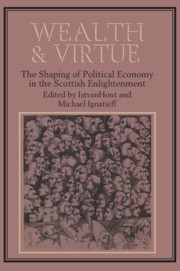Book contents
- Frontmatter
- Contents
- Preface
- List of abbreviations
- 1 Needs and justice in the Wealth of Nations: an introductory essay
- 2 Where had the Scottish economy got to by the third quarter of the eighteenth century?
- 3 Gershom Carmichael and the natural jurisprudence tradition in eighteenth-century Scotland
- 4 The Scottish professoriate and the polite academy, 1720–46
- 5 From applied theology to social analysis: the break between John Locke and the Scottish Enlightenment
- 6 The Scottish Enlightenment at the limits of the civic tradition
- 7 Adam Smith as civic moralist
- 8 The legal needs of a commercial society: the jurisprudence of Lord Kames
- 9 Cambridge paradigms and Scotch philosophers: a study of the relations between the civic humanist and the civil jurisprudential interpretation of eighteenth-century social thought
- 10 Adam Smith's ‘enduring particular result’: a political and cosmopolitan perspective
- 11 The ‘rich country–poor country’ debate in Scottish classical political economy
- 12 John Millar and individualism
- 13 Scottish echoes in eighteenth-century Italy
- Index
4 - The Scottish professoriate and the polite academy, 1720–46
Published online by Cambridge University Press: 05 June 2012
- Frontmatter
- Contents
- Preface
- List of abbreviations
- 1 Needs and justice in the Wealth of Nations: an introductory essay
- 2 Where had the Scottish economy got to by the third quarter of the eighteenth century?
- 3 Gershom Carmichael and the natural jurisprudence tradition in eighteenth-century Scotland
- 4 The Scottish professoriate and the polite academy, 1720–46
- 5 From applied theology to social analysis: the break between John Locke and the Scottish Enlightenment
- 6 The Scottish Enlightenment at the limits of the civic tradition
- 7 Adam Smith as civic moralist
- 8 The legal needs of a commercial society: the jurisprudence of Lord Kames
- 9 Cambridge paradigms and Scotch philosophers: a study of the relations between the civic humanist and the civil jurisprudential interpretation of eighteenth-century social thought
- 10 Adam Smith's ‘enduring particular result’: a political and cosmopolitan perspective
- 11 The ‘rich country–poor country’ debate in Scottish classical political economy
- 12 John Millar and individualism
- 13 Scottish echoes in eighteenth-century Italy
- Index
Summary
The Darien scheme, viewed with the benefit of hindsight, can be seen as a do-or-die attempt on the part of its instigators to win the Scottish polity a firm economic base. If so, it had a patriotic equivalent in the cultural sphere – the Visitation of the Scottish universities in the 1690s. The ‘presbyterian and whiggish crew’ (as seen by the jaundiced eye of Dr Archibald Pitcairne) came once more into their own after the Revolution of 1688, determined on a thoroughgoing policy to restore the godly republic heralded by Knox and Melville. The instruments to hand for this cultural revolution were the Scottish universities, preordained by Melville as suppliers of a godly ministry. The spirit in which Principal Hadow of St Andrews and his fellow visitors approached their task was that of renewers of the well-springs of Calvinist orthodoxy; consequently they were zealous not only in hunting out those professors suspected of lukewarmness or worse, but in examining and pronouncing on the curriculum. Their aim was to establish a set of texts which would be the agreed and established basis of the arts curriculum in particular. It proved very difficult to settle on proper authors and texts, so that the colleges were required to go away and each draft a suitable text of their allotted part of the curriculum. This enterprise ran into the sands, however, as authorship by committee often does, and the texts were not delivered on schedule or subsequently adopted universally, as had been hoped.
- Type
- Chapter
- Information
- Wealth and VirtueThe Shaping of Political Economy in the Scottish Enlightenment, pp. 89 - 118Publisher: Cambridge University PressPrint publication year: 1983
- 4
- Cited by

